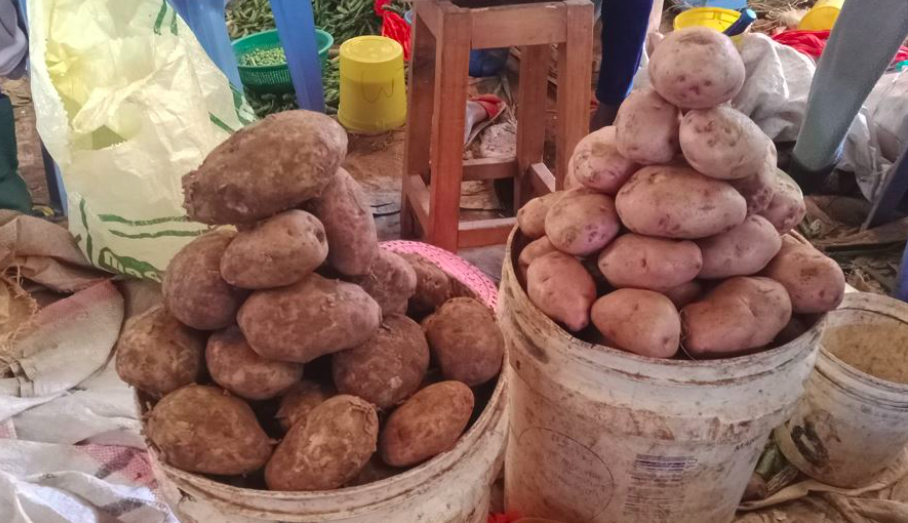 The scientists identified three popular potato varieties grown in Kenya –Shangi, Sherekea, and Wanjiku – which can carry the cholera vaccine.
The scientists identified three popular potato varieties grown in Kenya –Shangi, Sherekea, and Wanjiku – which can carry the cholera vaccine.That is exactly what scientists from three Kenyan universities have proposed – turning commonly-consumed potatoes into edible cholera vaccines.
The process involves inserting
into the potato plant's DNA a special bacteria that carries the vaccine gene.
The potato plant then grows with the vaccine built in.
They detailed this approach in their paper “Engineering local Kenyan Irish potato varieties as carriers for edible cholera vaccines” published in Discover Plant, on June 2.
The Kenyan experts said such potatoes could radically transform vaccine accessibility in remote and poor parts of Kenya.
They identified
three popular potato varieties grown in Kenya –Shangi, Sherekea, and Wanjiku –preferred because of their “high
yield, consumer preference, and suitability for genetic transformation.”
Shangi, for instance, matures quickly and has a high yield, making it ideal for large-scale production.
Cholera is caused by the bacterium Vibrio cholerae, and can be prevented through an oral vaccine which must be stored under certain temperature levels.
This cold chain storage requirement makes vaccines hard to deliver to remote or rural areas without reliable electricity.
Starting February this year, at least 244 cases of cholera and 11 deaths have been reported in Kenya, according to the Ministry of Health.
“Existing traditional vaccines are costly to manufacture and require specialised cold-chain storage, alongside transportation and distribution systems, which may not be readily available facilities especially in limited-resource settings,” the scientists explained.
They are Beenzu Siamalube and Emmanuel Ehinmitan from Pan African University; Maina Ngotho and Justus Onguso of the Jomo Kenyatta University of Agriculture and Technology; and Steven Runo from Kenyatta University.
So why potatoes? Aside from being a common food, they offer unique advantages. “Potatoes can be
cultivated on a large scale with minimal additional investment,” the experts said.
They referenced earlier studies, including one from 2005 where humans consumed genetically engineered potatoes expressing a hepatitis B antigen.
The results showed that 62.5 per cent of participants who consumed three doses developed increased immunity. “This study demonstrated the potential of plant-based oral vaccines to boost immunity in individuals previously vaccinated,” the authors write.
Still, turning potatoes into syringeless immunisation is not without challenges.
Since potatoes are typically cooked before eating, there is a risk that heat might degrade the vaccine. “Cooking can degrade some of the antigenic proteins,” they noted.
Another obstacle is public perception. “Public skepticism toward genetically modified organisms (GMOs) further complicates their acceptance, particularly for vaccines intended for direct consumption.” The authors suggest that science communication and stakeholder engagement will be essential in building trust.
Regulatory concerns also loom large. In Kenya, the use of GM crops is governed by the National Biosafety Authority. The study calls for “developing regional or national regulatory guidelines specific to plant-derived biologics,” alongside robust safety testing like allergenicity and gene flow analysis.
Despite these hurdles, the promise is too great to ignore. “By harnessing the power of molecular farming, scientists can produce vaccines and therapeutic proteins in potatoes, offering a near-user-site alternative to traditional production methods,” the researchers emphasise.
They said genetically engineered potatoes could even carry vaccines for other diseases such as malaria and ebola. They even propose integrating these edible vaccines into “school feeding programmes” to ensure wide access.
However, their paper only offers a detailed conceptual and methodological framework, but no experimental or proof-of-concept studies on the same have been done in Kenya.
As of now, no plant-based edible vaccines have been approved for public use in humans globally.



![[PHOTOS] Kindiki leads economic empowerment forum in Wajir](/_next/image?url=https%3A%2F%2Fcdn.radioafrica.digital%2Fimage%2F2025%2F08%2F5a14de4c-c863-48bb-819d-36f1f26ae789.jpeg&w=3840&q=100)







